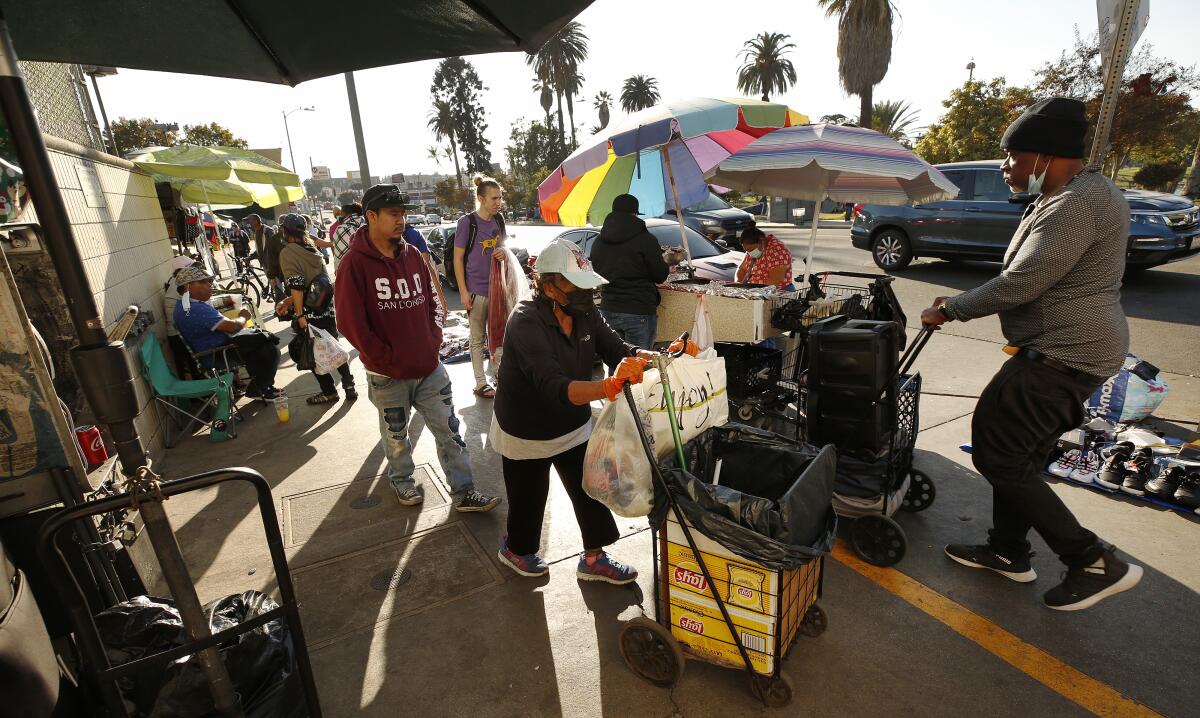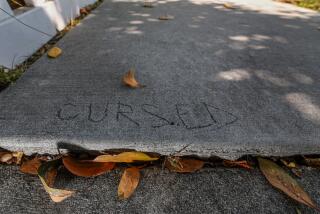L.A. could roll back move to ticket sidewalk vendors who lack permits

Los Angeles is weighing whether to formally reinstate a moratorium on ticketing unpermitted vendors who sell hot dogs, elote and other street foods on its sidewalks, reversing a decision made in the early days of the pandemic.
Under the proposal, the city would not issue citations to food vendors who lack permits, focusing instead on education and outreach to vendors.
In their proposal, council members Nithya Raman and Curren Price argued that with restaurants now allowed to set up outdoor dining, it is time to reinstate an earlier moratorium on such citations for vendors. Price said sellers would still need to follow other rules that outline where vending can occur but would not be fined for lacking a city permit.
At a Tuesday meeting of a council committee focused on economic development, however, Councilman Bob Blumenfield questioned whether the move would be purely symbolic. Streets officials said they had not cracked down aggressively on vendors for lacking permits, instead focusing on other violations.
Commerce: A dozen merchants unveil colorful carts, culminating five years of negotiations to control push-cart operations.
Last year, the Los Angeles City Council voted to begin enforcing its rules against food vendors who lack permits, saying it would help protect people during the pandemic. At the time, restaurants and many other businesses had been closed.
Doing so effectively cut short a grace period for food sellers: Until then, L.A. had been enforcing some rules about where and how people could vend but not handing out citations for lacking a city permit. The city had been trying to give vendors time to obtain permits under a new system, with that grace period initially expected to last through June.
More than 600 citations have been handed out to vendors since the city stepped up its enforcement last year, including tickets for other violations besides lacking permits, according to the streets department. However, a department spokeswoman said it was unable to immediately clarify how many of those citations were for unpermitted vending.
An additional 2,000 notices of violation — which do not carry a financial penalty — have been issued to vendors. Streets officials said Tuesday that warnings have been much more common than citations.
“We do concur that due to the pandemic, this would not be a time to cite folks simply for just not having a permit,” said Gary Harris, chief of the investigation and enforcement bureau of StreetsLA. “And we will continue not to do so.”
Raman argued that even if that is the case, “when it’s not clear whether enforcement is happening or not ... it can create an uneven playing field” in which “more vulnerable residents are subject to harassment.”
It is unclear how long a potential moratorium could last. Price, who had initially proposed that it last six months beyond the COVID-19 emergency period, asked for streets officials to report back on that issue. The committee backed the idea of instructing the streets department not to cite food vendors for lacking permits, which must be approved by the full council.
When L.A. council members decided to stiffen enforcement last March, only 29 vendors had obtained city permits to sell food on its sidewalks. That number now stands at 134, a small fraction of the estimated number of L.A. vendors hawking food. Many more vendors — roughly 1,300 — have obtained city permits to sell other merchandise, according to the city.
Food vendors and their advocates said the biggest barrier to legalization has been getting a health permit from the county, which is needed to get a city permit. The Los Angeles Street Vendor Campaign complained that the county process was difficult to navigate and prohibitively expensive for many vendors, with fees exceeding $1,500 for some sellers.
In addition, they said, there is no affordable cart on the market that meets the requirements for selling hot food. Carla De Paz, an organizer with the Community Power Collective, said that hot dog carts can cost between $15,000 and $20,000, and available carts for grilling meat can cost as much as $30,000 and don’t fit on city sidewalks.
Doug Smith, supervising senior staff attorney with the law firm Public Counsel, argued that “it’s not fair to fine a vendor for not having a permit when we can’t offer them a real path to getting one.”
The point of halting citations “is not to ask the city to wait around and do nothing,” Smith said. “There’s real work to do — and the moratorium gives the city a window to do it.”
Brick-and-mortar businesses in Los Angeles would get a chance to oppose vendors planning to set up shop on adjacent sidewalks but would not be able to turn them down outright under a revised proposal for new regulations approved Tuesday at City Hall.
Although no one opposed the idea of formally easing enforcement at Tuesday’s meeting, some residents and restaurateurs have complained in the past about vendors neglecting sanitation. In an interview, former restaurant owner David Burkin called the proposed moratorium “a poor idea under current conditions with COVID.”
“What kind of message are you telling people?” asked Burkin, who owned two restaurants in the San Fernando Valley that shut down permanently during the pandemic. “You have to wash your hands going in and out of every place you go, but you let people serve food on a cart that you can’t guarantee the sanitation or the temperature?”
Adam Englander, a registered lobbyist who serves as executive director of the Independent Hospitality Coalition, said that if the city is easing up on sidewalk vendors, it should do the same for restaurants that have faced new regulations.
“You can’t have a lack of enforcement on one sector and not others,” Englander said.
Raman spokesman Jesse Zwick said that even if the city avoids citing unpermitted vendors, doing so would not stop the county from enforcing the health code, which falls under its jurisdiction. Streets officials also said Tuesday that reinstating the moratorium would not affect their ability to cite vendors for violating safety rules.
Vending advocates also argued that sidewalk sellers hadn’t received the financial support available to brick-and-mortar restaurants amid COVID-19.
Merlin Alvarado, a Honduran immigrant who sells hot dogs and fruit in Hollywood, said that when the pandemic began, she stopped going out to sell food for months, until she absolutely had to earn money for groceries and dish soap. Alvarado does not have an L.A. permit: She said the costs are too high and the area where she has regularly worked — the Hollywood Walk of Fame — has been banned for vendors anyway.
“For us, the help has been minimal,” Alvarado said in Spanish. She estimated that her sales have plunged 80%, forcing her to choose which bills to pay. “This has been the most difficult year that I’ve had in the United States.”
More to Read
Sign up for Essential California
The most important California stories and recommendations in your inbox every morning.
You may occasionally receive promotional content from the Los Angeles Times.












